By Dave Smith, Chief Product Officer, Payscale
Managers know that engaged employees are more effective. But despite the vast amount of employee engagement research out there, very little of it focuses on a person’s primary reason for employment in the first place: getting paid.
PayScale, the compensation software company where I work, surveyed 71,000 employees to study the relationship between pay and employee engagement. The study results revealed that one of the top predictors of employee sentiment, including “satisfaction” and “intent to leave,” was a company’s ability to communicate clearly about compensation. In fact, open and honest discussion around pay was found to be more important than typical measures of employee engagement, such as career advancement opportunities, employer appreciation and future enthusiasm for the company.
Pay is a crucial component of engagement because it’s not just a number; it’s an emotional measure reflecting how valued an employee feels by their employer. And it turns out, how people feel about their deal plays a huge role in how engaged they are in their work. While there’s still a lot to learn about the connection between the perception and reality of compensation, and how both relate to engagement, we identified a few interesting data points that may change how you talk to your employees about pay.
First, people are often wrong about how much they’re paid compared to the going market rate. Perceptions about pay don’t always reflect reality, even if employers are paying the same — or more — than similar companies. In fact, a whopping two-thirds of people who are being paid the market rate believe they’re actually underpaid, representing a huge discrepancy.
This leads to our second finding: perceptions about pay play a significant role in an employee’s desire to leave your company. This may sound obvious, but our survey showed that “intent to leave” decreased in relation to how favorable an employee felt about their pay. For example, 60% of employees who perceived they were underpaid said they intended to leave, compared to only 39% of those who perceived they were overpaid. The bottom line is this: if you don’t communicate to your employees that they are being paid fairly compared to their talent market, they may leave.
Read the rest of this article from HBR.org HERE
___________
Dave Smith is the Chief Product Officer at PayScale, creator of the world’s largest database of unique salary profiles. He leads a team that builds compensation solutions designed to help businesses attract and retain talent.
Reprinted from HBR.org







